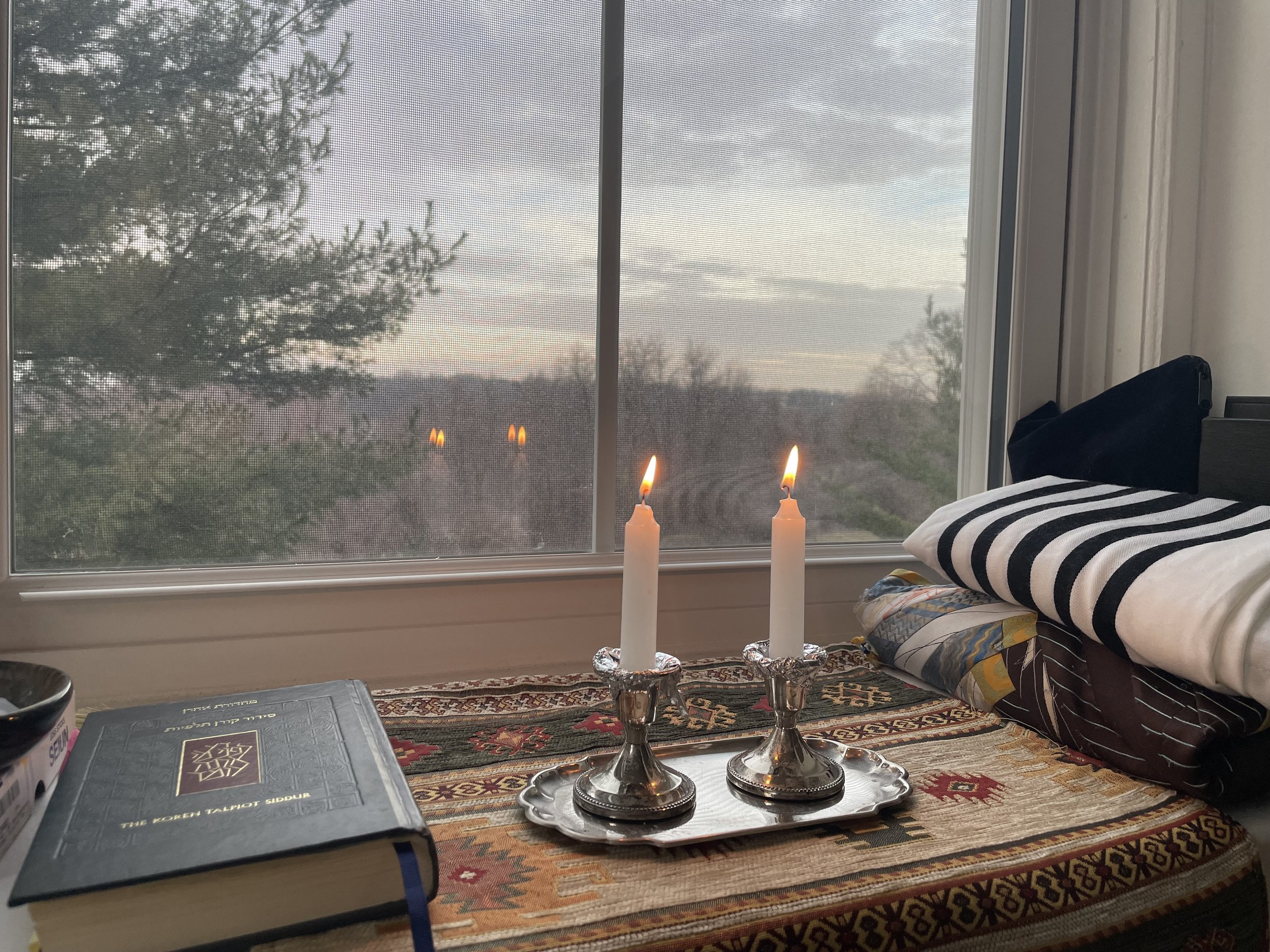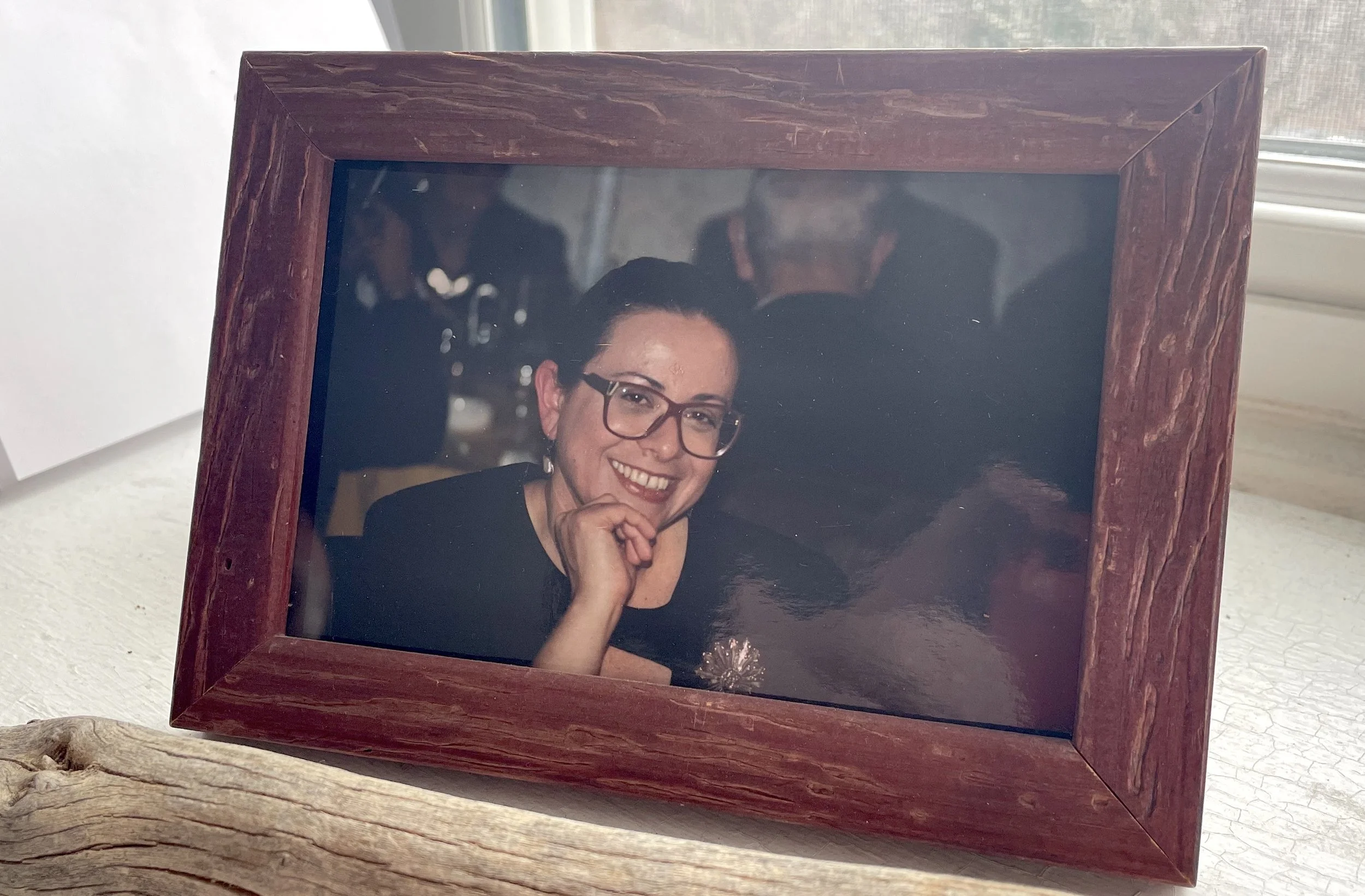Barur
The Ancestral, the Emergent, and My Mother’s Candlesticks.
A few months ago my Aba Benni told me he found a set of candlesticks. He told me a story relating to my mother, Zehava bat Yosef v’Sarah z”l (זהבה אפעל, זהבה בת יוסף ושרה ז״ל) who was a youth psychologist and counselor at a grade school in a town called Tel Mond in central Israel and during the Palestinian intifada. There were many terror attacks within Israel and buses that exploded in major cities. in 1994, one exploded in Dizingoff, Tel Aviv’s main street, with many casualties, including children from the school that she counseled.
My aba continued that my mother supported the families and other children who lost their friends. One day, a woman came to visit my mother - she was dati’ya, “a religious Jewish woman.” We had no religious friends, so I was very surprised when he said that. She gave her a gift as a token of appreciation of the support she offered to the families and the children. I don’t know if this woman was a parent of one of the children, possibly. The gift was a set of candlesticks. Who was that woman? I will never know. I reached out to local social media groups and see if I can find her.
My mother was diagnosed with stage 4 leukemia a few months later and passed away the following year at the age of forty-six, nearly my age, today. It was a shocking unfolding for my father, sister and I, rippling through to this day.
—
Rekindled
There is a lot behind the story above, especially today as Israel is facing historic political risk to its democracy, and tensions between religious and secular jews mount, affecting relationships with jews in the diaspora. All this as backdrop to intensifying fear I see from Palestinians friends and colleagues, bearing witness with apprehension as the Jewish state gambles with their future. The same gamble that pushed Qalqilya resident Saleh Abdel Rahim al-Souwi to blow himself up with 50 others on that dreaded bus in 1994.
My family never lit shabbat candles at home as I was growing up. What are we crazy dati’im (religious)? We used to have Friday night meals with my mother’s parents, but I think candles were already lit when we arrived? Not sure. This memory is hazy. Hearing my grandfather recite kiddush was the only piece of Jewish liturgy I encountered regularly as a child. His last name, before it was nationalized-hebrewized in Israel, was Kandel.
For twenty nine years, these candlesticks were never used. So when Aba told me this story, and then asked me whether I wanted these candlesticks. I said, “barur,” obviously. He traveled from Israel to visit me at my cloister in Peekskill, NY, and he brought the candlesticks with him. One Friday night during his visit, we were invited for Shabbat dinner at Rabbis Lisa Goldstein & Igal Harmelin’s home in Manhattan. With their natural grace and kindness, they lit Shabbat candles and led us in songs and kiddush blessing. My father was very moved.
Something else was rekindled. My parents home, and I believe my father’s home, was pretty secular. Part of the response to the trauma of the holocaust surviving generation of my grandparents was to distance from religiosity and Ashkenazi culture out of despair & disappointment with the lack of intervention, human or beyond. It resulted in many things: one, the maverick entrepreneurial cosmopolitan Israel on one hand, the occupation of Palestine that produced al-Souwi’s tragic action on the other, and people like myself and others on journeys of reclaiming erased, or forgotten, ancestral ways.
The Dream of Reclamation
Ancestral reclamation, inquiring into the grief and loss has been, for me, confusing, gut wrenching and cathartic. Rinse. Repeat. Facing the trauma of cultural erasure (from within my culture and from without, insult, outrage, injustice, moral injuries,) innocent forgetfulness ("who was that Datiyah woman?” I may never know. What was my mother’s favorite holiday?) the hard truth of impermanence - I sense the word reclamation doesn’t reach the extant of my experience.
The dream of reclamation seems real, feels real, it is ‘real’ in the sense that I experience it in this body and mind, but so is the lucidity of wakefulness in its midst. Awareness that is clear, bright, and present. One does not cancel the other. A dream doesn’t mean ‘meaningless,’ here I used it as mysterious, refracted, unfixed, malleable, porous. The dream is what I think with certainty about reality. When I am not aware of the dream-ness of how I perceive this reality, I suffer. Reality, on the other hand, just is.
As long as I am reaching to reclaim ‘my ancestral way!’ I am behind the curve, forever seeking an dream-idea of a completion, ‘if onlys’, ‘because ofs —’. a jumbled lot of threads, “justified threads!” they scold me back.
Drive All Yearning Into One
I hear an inner voice call, a variation on a Lojong Tibetan Buddhist mantra - “Drive all blame into one.” It echoes the Zohar’s (Book of Radiance, Medival Jewish mystical book) experience of Aalin b’khad tiuvtah, Aramaric for “entering through one desire,” funneling the seventy sefirotic (Kabbalist universal emanations) arms into one.
Sifting through all of it, finding the thread of each moment of grief, each outrage, each confusion, yearning, following it not to completion of reclamation of an idea, ‘Now I am one with my ancestors! Now I remember my mother well!’, ‘THIS is what it means to be A —,’ but reclamation of Presence, itself.
The Hebrew word Barur / ברור comes from the root for sifting through, clarity through discernment. Through the twisting valleys of my identities, towards This.
Reclamation and Remembrance rub with the notion of time. Lucidity within Remembrance reveals a different kind of time. Deep time, a geological term used to describe the eons it takes natural forces to create mountains and oceans, here used not (only) for the far reaches of the past and future, but a vertical deep time, the folding of all past present and future epochs into this. My cantorial teacher Hazzan Jack Kessler introduced me to Deep Time, and to how prayer is designed to open portals of such altered states of consciousness. (Mental note: Asha”n, Olam, Shana, Nefesh - Shana as deep time.)
Ancestral:Emergent
What is it like for me to shift from reclaiming, to nurturing grief - the emotional energetic charge of yearning - in the present moment - not trying to recreate a past horizon that is always receding away from me, but to bear witness to grief and yearning, now, in whatever form it appears in my body and mind, and nurse that. I call this quality of reality the ancestral:emergent. Neither an archaic ancestral (expressing over-identification, trauma), nor a detached emergent (also known as spiritual bypassing, a stoic “Now.”) - but an unfolding, allowing for new forms to rise from infinite porous reality, blockages released, passing gracefully through the risk of ossifying 'old ways, forever.’
What is it like to live on this edge of this ancestral:emergent, aware of the dream, the yearning for a past and a future shaped by ancestral tendril, and engage that with a radical faith, practice, and experience of Presence? There are no maps to how this unfolds. There is no more allegiance to a shadowy-ellusive past. There, freedom.
Bringing to mind, in this deep time, the forever-lost face of the woman who gifted these candlesticks to my mother, little al-Souwi held by his own mother in a brick home in Qaulailya’s hills, children on bus 50, Israeli Rabbinic Politician pummeling a controversial (old) Jewish-law rule, grey shtetls in Poland & Hungary, mountains rising, oceans openings. Beresheit / Genesis. End of time. This.
What would deep time do to the fires taking Israel’s warring between secular and religious, Israelis and Palestinians, Mizrachi and Ashkenazi do? Messy, chaotic, raw and real, yet lucid, present - where grief can manifest, be loved in the fire of yearning — Grief for all those we lost and will lose. But more fundamentally, the grief of the separation from deep time, Presence, itself?
—
Every following day during my father’s visit, whenever I came to visit him for dinner at his Airbnb, he would ask me if I wanted to light candles and I’ll say “Aba, ze lo shabbat,” it’s not shabbat, and he’d say with eager eyes and a smile it doesn’t matter we can always light shabbat candles, and I’d say, yeah that’s right, that’s right, we can always light shabbat candles. Barur.


